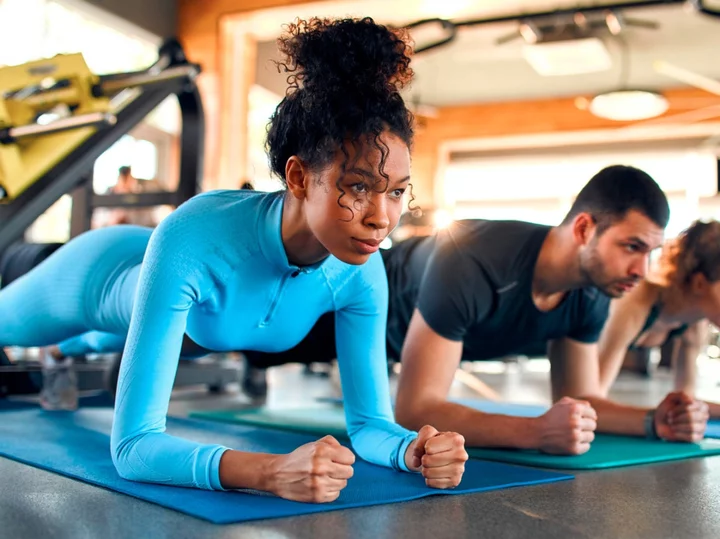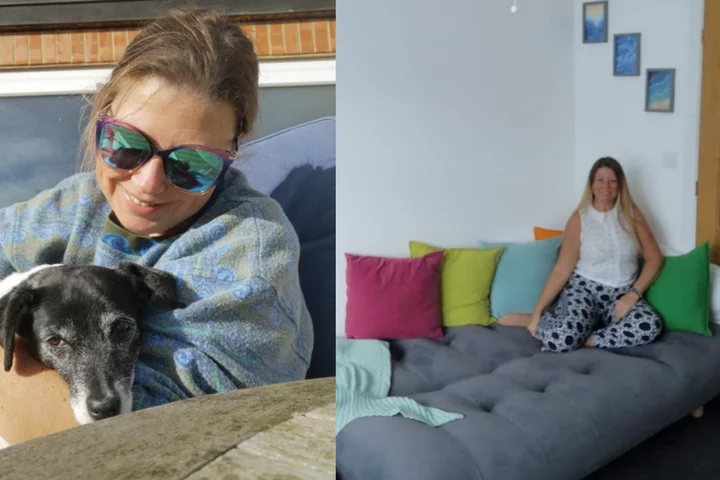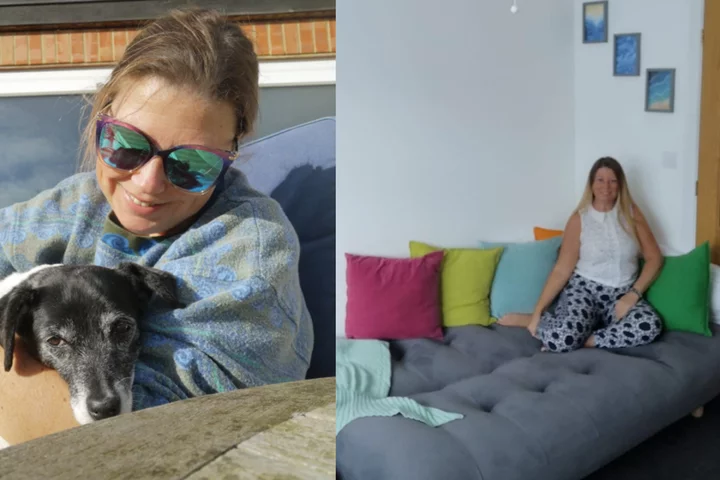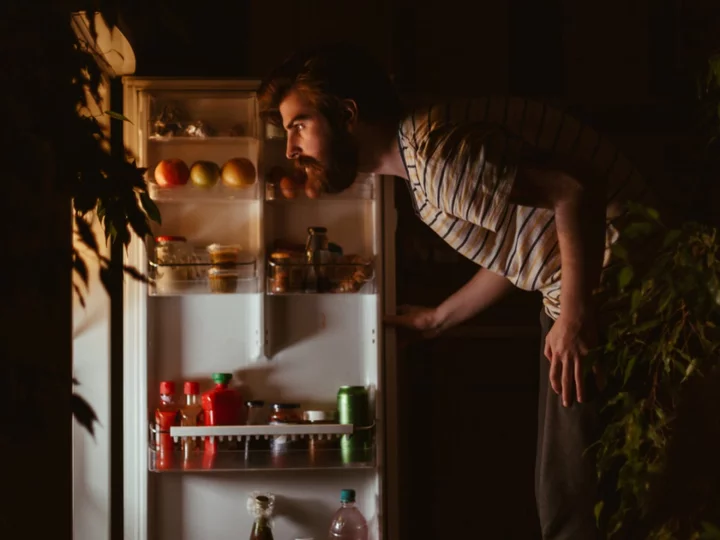
The two best exercises for lowering blood pressure, according to study
Exercises such as “wall sits” could be the best form of activity to help people reduce blood pressure, a new study suggests. Other physical activity including cardio, resistance training and HIIT workouts are also good for bringing down resting blood pressure levels, researchers found. But isometric exercises – those that involve engaging muscles without movement, such as wall sits and planks – provide the best results, they said. The study, published in the British Journal of Sports Medicine, saw researchers conduct analysis on previous studies looking at exercise and blood pressure. Some 270 studies were included in the final analysis which contained data on almost 16,000 people. They examined the impact different exercises had on systolic blood pressure, which notes the force at which the heart pumps blood around the body; and diastolic blood pressure, the resistance to the blood flow in the blood vessels between heartbeats when blood is pumped around the heart. The researchers, led by academics at Canterbury Christ Church University in Kent, found that there were significant reductions in resting blood pressure following cardio (aerobic exercise); dynamic resistance training, such as squats, press-ups and weights; high intensity interval training (HIIT); and combined training and HIIT. But the largest reductions were seen after isometric exercise training. A secondary analysis on specific types of exercises found the most benefit was seen among those who performed “isometric wall squats” and among runners. The academics said that current exercise recommendations for the prevention and treatment of high blood pressure are based on “older data” and suggest that it may be time to review the current guidelines. “Aerobic exercise training, dynamic resistance training, combined training, high-intensity interval training and isometric exercise training are all significantly effective in reducing resting systolic and diastolic blood pressure,” they wrote. “Overall, isometric exercise training is the most effective mode in reducing both systolic and diastolic blood pressure. “These findings provide a comprehensive data driven framework to support the development of new exercise guideline recommendations for the prevention and treatment of arterial hypertension.” For the average adult high blood pressure is considered to be from 140/90mmHg. When a person’s blood pressure is too high it puts extra strain on blood vessels, heart and other organs, such as the brain, kidneys and eyes. Persistent high blood pressure can lead to a number of serious health problems including heart attacks, strokes and vascular dementia. While there are medications which can help, people can make a number of life-style changes to help bring their blood pressure down including regular exercise, losing weight, cutting back on caffeine, alcohol and salt. Read More Dating app screenshot culture is out of control Husband fired from family business after wife roleplayed with reborn dolls The bowel cancer symptom George Alagiah wished he’d caught earlier Charity boss speaks out over ‘traumatic’ encounter with royal aide Ukraine war’s heaviest fight rages in east - follow live
2023-07-28 19:57

Experts reveal the most unhygienic things in your kitchen – and how to get them clean
It’s likely there are countless things in your kitchen which look clean, but actually, they’re filthy. Could your dishcloths be making you sick? When was the last time you washed your tea towels? And do we really need to bleach the sink more than once a month? We asked an expert to find out. Knobs, door handles, and buttons The buttons and dials on your kitchen appliances could be a germ-fest. “People often neglect to clean these areas of the kitchen,” says Danielle Mason, a cleaning content creator – or ‘cleanfluencer’ – who creates tutorials and videos on TikTok and Instagram. “Most of the time, they don’t think it is important, but as you’re commonly handling raw meat and food, it’s extremely important to keep these areas clean, due to cross-contamination. “Always sanitise with a cloth – I like to do this with Zoflora, as it leaves a great smell afterwards, and kills bacteria from dirty fingers.” Cloths If what you clean with isn’t clean, chances are, your kitchen isn’t either. “I always leave my cloth to soak in bleach before going to bed every night,” says Mason. “This enables a new start in the morning with no bacteria. Also, make sure you’re replacing the cloths – I would suggest a new one every two weeks, whilst still bleaching every night. And make sure you’re not using this cloth on anything other than the kitchen, as you do not want to cross-contaminate.” Sponges Mason stresses sponges are unhygienic, as they’re constantly damp and can carry E. coli. “People tend not to use sponges, as they carry so many more germs, and even putting them in the microwave will not kill all of them. Avoid a sponge where possible.” Dish towels Dish towels and tea towels may not be changed anywhere near often enough. “You should have one for every day of the week, as they carry so many bacteria and germs, which get spread across the kitchen. If you’re drying pots and pans, and then wiping down your surfaces, it’s not good,” she says. Chopping boards Chopping boards – particularly wooden ones – could be a haven for bacteria. “You should have a different colour for different types of food, one for meat, fruit, and other foods,” advises Mason. “The best way to clean them is in a dishwasher, as it’s good to get rid of all the germs due to the very high heat. If you don’t like the dishwasher, then boil the kettle water and leave the chopping boards to soak in it. I use a steam cleaner on mine, as it kills 99.9% bacteria and there are no chemicals.” It is best to avoid wooden chopping boards altogether, as these cleaning methods may damage them. Kitchen sink “This is a massive breeder of bacteria and grime; a distinct microbiome is found in sinks. “The plumbing area found beneath sinks revealed microbial communities dominated by a group of bacteria called Proteobacteria. This phylum includes pathogens such as Salmonella and E. coli, which can cause serious disease,” Mason shares. “I’ve always been taught never to wash my hands in the sink, and to never throw dirty water down the sink. You wash your cups and plates in the sink and prepare food, so it should always be kept clean, and nothing from outside the kitchen should cross-contaminate that. For example, never wash your floors and put dirty water in your kitchen sink, always throw it down the toilet.” How do you possibly clean the inside of your sink and drains? “Baking soda and vinegar is the best way to clean your sink out, or bleach, but you must be careful with bleach, as it can stay in the bottom of your sink, depending on the material it’s made of. I clean my sink out every day.” Pipes and cupboards around your sink could be leading you to have a rodent problem. “You can prevent mice and rodents from entering the kitchen by covering any small crevices or cracks. It is also important to repair leaks as soon as they happen, as they can come through the pipes,” she says. Fridges “Deep clean [your fridge] every two months. A normal cleaning – the wiping of shelves – should be done every other day with soapy water. For any bad smells, use baking soda, which will absorb the smell from the fridge,” Mason continues. “The fridge is a breeding ground for salmonella, E. Coli and other bacteria.” Bins Where you throw your waste away could be a breeding ground for germs. “Make sure you keep [outdoor] rubbish bins away from your house, and make sure you empty your bin as soon as it’s full,” advises Mason. “I personally do not keep a bin in the kitchen, I use a bag and I take that out by the end of the day, but if you are using a bin, make sure you bleach it with hot kettle water, to keep it smelling fresh.” Read More This is why you keep waking up at 4am – and what you can do about it TV chef James Martin reveals cancer diagnosis in apology over ‘bullying’ allegations Bursts of activity that make you huff and puff ‘linked to reduced cancer risk’ Charity boss speaks out over ‘traumatic’ encounter with royal aide Ukraine war’s heaviest fight rages in east - follow live
2023-07-28 17:48

The most unhygienic things in your kitchen revealed – and how to get them clean
It’s likely there are countless things in your kitchen which look clean, but actually, they’re filthy. Could your dishcloths be making you sick? When was the last time you washed your tea towels? And do we really need to bleach the sink more than once a month? We asked an expert to find out. Knobs, door handles, and buttons The buttons and dials on your kitchen appliances could be a germ-fest. “People often neglect to clean these areas of the kitchen,” says Danielle Mason, a cleaning content creator – or ‘cleanfluencer’ – who creates tutorials and videos on TikTok and Instagram. “Most of the time, they don’t think it is important, but as you’re commonly handling raw meat and food, it’s extremely important to keep these areas clean, due to cross-contamination. “Always sanitise with a cloth – I like to do this with Zoflora, as it leaves a great smell afterwards, and kills bacteria from dirty fingers.” Cloths If what you clean with isn’t clean, chances are, your kitchen isn’t either. “I always leave my cloth to soak in bleach before going to bed every night,” says Mason. “This enables a new start in the morning with no bacteria. Also, make sure you’re replacing the cloths – I would suggest a new one every two weeks, whilst still bleaching every night. And make sure you’re not using this cloth on anything other than the kitchen, as you do not want to cross-contaminate.” Sponges Mason stresses sponges are unhygienic, as they’re constantly damp and can carry E. coli. “People tend not to use sponges, as they carry so many more germs, and even putting them in the microwave will not kill all of them. Avoid a sponge where possible.” Dish towels Dish towels and tea towels may not be changed anywhere near often enough. “You should have one for every day of the week, as they carry so many bacteria and germs, which get spread across the kitchen. If you’re drying pots and pans, and then wiping down your surfaces, it’s not good,” she says. Chopping boards Chopping boards – particularly wooden ones – could be a haven for bacteria. “You should have a different colour for different types of food, one for meat, fruit, and other foods,” advises Mason. “The best way to clean them is in a dishwasher, as it’s good to get rid of all the germs due to the very high heat. If you don’t like the dishwasher, then boil the kettle water and leave the chopping boards to soak in it. I use a steam cleaner on mine, as it kills 99.9% bacteria and there are no chemicals.” It is best to avoid wooden chopping boards altogether, as these cleaning methods may damage them. Kitchen sink “This is a massive breeder of bacteria and grime; a distinct microbiome is found in sinks. “The plumbing area found beneath sinks revealed microbial communities dominated by a group of bacteria called Proteobacteria. This phylum includes pathogens such as Salmonella and E. coli, which can cause serious disease,” Mason shares. “I’ve always been taught never to wash my hands in the sink, and to never throw dirty water down the sink. You wash your cups and plates in the sink and prepare food, so it should always be kept clean, and nothing from outside the kitchen should cross-contaminate that. For example, never wash your floors and put dirty water in your kitchen sink, always throw it down the toilet.” How do you possibly clean the inside of your sink and drains? “Baking soda and vinegar is the best way to clean your sink out, or bleach, but you must be careful with bleach, as it can stay in the bottom of your sink, depending on the material it’s made of. I clean my sink out every day.” Pipes and cupboards around your sink could be leading you to have a rodent problem. “You can prevent mice and rodents from entering the kitchen by covering any small crevices or cracks. It is also important to repair leaks as soon as they happen, as they can come through the pipes,” she says. Fridges “Deep clean [your fridge] every two months. A normal cleaning – the wiping of shelves – should be done every other day with soapy water. For any bad smells, use baking soda, which will absorb the smell from the fridge,” Mason continues. “The fridge is a breeding ground for salmonella, E. Coli and other bacteria.” Bins Where you throw your waste away could be a breeding ground for germs. “Make sure you keep [outdoor] rubbish bins away from your house, and make sure you empty your bin as soon as it’s full,” advises Mason. “I personally do not keep a bin in the kitchen, I use a bag and I take that out by the end of the day, but if you are using a bin, make sure you bleach it with hot kettle water, to keep it smelling fresh.” Read More Charity boss speaks out over ‘traumatic’ encounter with royal aide Ukraine war’s heaviest fight rages in east - follow live Laura Whitmore: I feel unsafe as a woman Meet the professional cuddler charging £70-an-hour to hug ‘the big spoons in life’ New warnings about ‘concerning’ rise in at-home cosmetic dentistry
2023-07-27 14:19

Sarah Jessica Parker says she and Matthew Broderick cook ‘every night’ with their three children
Sarah Jessica Parker has shared a rare glimpse inside her family life with husband Matthew Broderick. In a recent appearance on the Table for Two with Bruce Bozzi podcast, the Sex and the City alum revealed the daily routine that she and her husband share with their three children: son James, 20, and 14-year-old twin daughters Tabitha and Marion. “We cook every night,” she told host Bozzi during Tuesday’s episode. “It’s a source of a huge amount of pride for everybody.” The And Just Like That star even admitted that the family rarely orders takeout, adding how surprised she is to hear when other families order to-go. “It’s also mystifying because we just don’t order in as a family,” Parker said. “And on the rare occasion we have - we always hear other families, they do it, and then like one kid orders from this place and one kid…it’s so confusing.” While Parker’s iconic Sex and the City character Carrie Bradshaw is notorious for her lack of culinary skills, the 58-year-old actor assured that her family “really [does] cook five to six nights a week”. “We have always have a Sunday dinner - we invite people,” she added. Throughout the years, Sarah Jessica Parker and Matthew Broderick have kept much of their family life out of the spotlight. Although the longtime couple have been married since 1997, the Hocus Pocus star recently revealed that they haven’t “spent a night apart” from each other in more than three decades. While speaking on Sirius XM’s The Howard Stern Show earlier this month, Parker recalled that her first date with the Ferris Bueller’s Day Off actor took place on 8 March 1992, and that she and her partner have “been together” ever since. “We’ve never spent a night apart since then, with the exception of work on location,” she told host Stern. “Or, his mother was ill for a bit so he went to take care of her. But from that first night, we’ve never been apart.” Parker said that “pretty soon into” their relationship, she felt like she was “in love” with Broderick and thought he was “really incredible”. The actor explained how she “admired” her soon-to-be husband before they started dating, noting that she had “loved” his work. “He’s so smart, he’s so funny, I like this choice of friends, the way he was living in New York, what was important to him, how he kind of travelled around the city,” she said. “He was always travelling around on his bicycle, he’s been riding bikes since he was 14.” The two also shared a common interest in raising a family in New York. “I love being home in New York,” Parker said. “I wanted to build a life here and he was born and raised in the West Village, literally, he’s never lived north of 11th Street.” Last month, Sarah Jessica Parker and Matthew Broderick celebrated their 26th wedding anniversary. “Happy 26th anniversary my husband,” she wrote on Instagram, alongside a photo of a champagne cork. “That sure was a nice celebration and a real nice bottle of champagne. And a gorgeous walk home. Oh the miles we have strolled together. I love you. XOX, your SJ.” Read More Sarah Jessica Parker reveals she and husband Matthew Broderick haven’t ‘spent a night apart’ in 31 years Sarah Jessica Parker says she ‘missed out’ on ‘old-fashioned facelift’ as she reflects on ageism Sarah Jessica Parker rewears iconic Vivienne Westwood wedding dress in And Just Like That Sarah Jessica Parker shares rare glimpse into her family life What is cardiac arrest? The condition that LeBron James’ son suffered from Mother asks if children should be ‘forced to share’ after park incident
2023-07-27 04:27

Sarah Jessica Parker shares rare glimpse inside her family life: ‘We cook every night’
Sarah Jessica Parker has shared a rare glimpse inside her family life with husband Matthew Broderick. In a recent appearance on the Table for Two with Bruce Bozzi podcast, the Sex and the City alum revealed the daily routine that she and her husband share with their three children: son James, 20, and 14-year-old twin daughters Tabitha and Marion. “We cook every night,” she told host Bozzi during Tuesday’s episode. “It’s a source of a huge amount of pride for everybody.” The And Just Like That star even admitted that the family rarely orders takeout, adding how surprised she is to hear when other families order to-go. “It’s also mystifying because we just don’t order in as a family,” Parker said. “And on the rare occasion we have - we always hear other families, they do it, and then like one kid orders from this place and one kid…it’s so confusing.” While Parker’s iconic Sex and the City character Carrie Bradshaw is notorious for her lack of culinary skills, the 58-year-old actor assured that her family “really [does] cook five to six nights a week”. “We have always have a Sunday dinner - we invite people,” she added. Throughout the years, Sarah Jessica Parker and Matthew Broderick have kept much of their family life out of the spotlight. Although the longtime couple have been married since 1997, the Hocus Pocus star recently revealed that they haven’t “spent a night apart” from each other in more than three decades. While speaking on Sirius XM’s The Howard Stern Show earlier this month, Parker recalled that her first date with the Ferris Bueller’s Day Off actor took place on 8 March 1992, and that she and her partner have “been together” ever since. “We’ve never spent a night apart since then, with the exception of work on location,” she told host Stern. “Or, his mother was ill for a bit so he went to take care of her. But from that first night, we’ve never been apart.” Parker said that “pretty soon into” their relationship, she felt like she was “in love” with Broderick and thought he was “really incredible”. The actor explained how she “admired” her soon-to-be husband before they started dating, noting that she had “loved” his work. “He’s so smart, he’s so funny, I like this choice of friends, the way he was living in New York, what was important to him, how he kind of travelled around the city,” she said. “He was always travelling around on his bicycle, he’s been riding bikes since he was 14.” The two also shared a common interest in raising a family in New York. “I love being home in New York,” Parker said. “I wanted to build a life here and he was born and raised in the West Village, literally, he’s never lived north of 11th Street.” Last month, Sarah Jessica Parker and Matthew Broderick celebrated their 26th wedding anniversary. “Happy 26th anniversary my husband,” she wrote on Instagram, alongside a photo of a champagne cork. “That sure was a nice celebration and a real nice bottle of champagne. And a gorgeous walk home. Oh the miles we have strolled together. I love you. XOX, your SJ.” Read More Sarah Jessica Parker reveals she and husband Matthew Broderick haven’t ‘spent a night apart’ in 31 years Sarah Jessica Parker says she ‘missed out’ on ‘old-fashioned facelift’ as she reflects on ageism Sarah Jessica Parker rewears iconic Vivienne Westwood wedding dress in And Just Like That What is cardiac arrest? The condition that LeBron James’ son suffered from Mother asks if children should be ‘forced to share’ after park incident Scientists share habits that could take 20 years off your life
2023-07-27 04:25

Meet the professional cuddler charging £70-an-hour to hug ‘the big spoons in life’
A professional cuddler who makes a living giving clients hugs has said people travel from all over the globe to receive the cuddle therapy she offers which is “far less intimate than a massage” and helps people from “all walks of life”. Natasha Wicks, 44, from Coventry, West Midlands, says that despite criticism, cuddling is scientifically proven to release happy hormones like dopamine and that a lot of her clients are “the big spoon in life” and go to her for emotional support that they do not have at home. As such, many of her clients are caregivers and most of them join Natasha for two-hour hugging sessions, costing £70 an hour. The sessions vary depending on what the client wants, some having “emotional hugs”, others talking more and some wanting to “sit at opposite ends of the sofa with our legs and feet entwined”. Natasha became a cuddle therapist in 2015 and, while she has had comments online from people criticising the practice, she said that her family and friends were unsurprised when she first started giving professional cuddles. She said: “They all said to me that I give the best cuddles so it’s not surprising that I’d start doing it as a job. “It’s very much what I do, I help people and want to make people feel better. It’s a natural thing when someone is going through a tough time to want to give them a hug. “Cuddle therapy might not be as widely accepted in society but it’s far less intimate than other things like massages which are seen as normal.” Prior to becoming a cuddler, Natasha originally trained as a CBT therapist and counsellor. She said: “There’d be situations where I would be talking to someone and they’d really need a hug, but obviously, you’d have professional boundaries in place and it wouldn’t have been appropriate. “It was just a really natural thing. One client had finished her final session and we had agreed that she wasn’t my patient anymore so we hugged goodbye. She said to me that she’d wanted to do that for a long time and I thought ‘me too’.” Looking into cuddle therapy, which she said was increasing in popularity in 2014, Natasha took a training course. By 2015, she was a qualified cuddler and started taking on new patients for cuddle sessions. Natasha provides a minimum session of one hour but said most people go for at least two hours, sometimes longer if they are receiving more than one type of therapy. She said: “I always give people a hug on the doorstep when they arrive and then they’ll come in and relax, and we’ll have an initial chat about what brings them here. After that, I’ll put on some ambient music and we’ll have a cuddle on my cuddle sofa. “It can be daunting coming into a stranger’s house and I can tell the difference in them from arriving to leaving. The first hug they might be angled away from me but when we’re hugging goodbye, I can get my head in between their neck and shoulders and you can almost feel that a weight has been lifted from them.” There is not one type of person that visits Natasha for cuddles, but she says that a lot of her clients are caregivers. She said: “There’s all sorts of people who come for a cuddle, from people who have moved away from home for the first time and just want a mum hug all the way to people in their 80s. “I’m inclusive of all genders and all ages. I get a lot of clients who are the carers of their family and they are so busy looking after other people, and probably giving the hugs and support to other people, that they don’t have that for themselves. “A lot of people that come to see me are generally people are the big spoon in the life – they take care of others and don’t want to show a vulnerable side to people because they don’t want people to worry that they can’t cope. “I get a lot of carers, a lot of NHS staff, a lot of mums, a lot of people that are in a world where they have to be the strong one in the situation and they just want to be able to come here and let their guard down.” Natasha’s priority is to make people feel at ease when they arrive as she said it can be “nerve wracking” turning up at someone’s house for a hug. Setting out clear boundaries prior to meeting, the therapist has said that the patients she has welcomed into her home have all been respectful. She added: “I always say to people that when your body relaxes, your tummy might crumble and mine might too, but that people don’t need to worry about it. Sometimes people fall asleep and they might snore or fart, it’s just natural things that happen. It’s happened twice where someone has got an erection and that’s fine, I have boundaries and we’ll just change position. “I want people to feel reassured that, as soon as they get in, they feel comfortable.” Despite the unconventional therapy, when Natasha first took on cuddle clients, she said her family were completely “unsurprised” and the step from CBT therapy to cuddle therapy was a “natural evolution”. While Natasha focuses her time on a holistic approach for treating people, she noted that there is also neuroscience behind cuddles. According to the 44-year-old, physical touch activates the brain’s orbitofrontal cortex and cuddling releases oxytocin, dopamine and serotonin. Now, Natasha also does EMDR therapy and is a mental health swim host, and has clients travel from all over the globe to receive her hugs. She said: “Working from Coventry is brilliant because I’m only nine minutes on the train from Birmingham Airport and people come to visit me from all over. I get a client from Belgium, someone from Ireland and people from all over the UK who come to see me. “I wanted to find a sofa bed that just looked like a big comfy sofa for cuddle sessions. I’d started off with a big L shaped sofa but after about five years, it was sagging a bit, there’d been a lot of healing done on that sofa and it was time for a new one. “Now I have a sofa bed in my living room that I use as my cuddle sofa. It’s in the living room and it’s used for everyday life, watching TV with my partner, having people round and also for my work.” Breaking down the taboo around cuddle therapy, Natasha hopes more people will embrace the alternative treatment. She added: “As it’s become more popular, more people are becoming qualified as cuddlers and I think that’s great. “I’ve had comments online before of people thinking it’s weird or not understanding but there are other things we accept in society that are much more intimate than cuddles, like massages. “It’s not weird, it’s actually a really lovely thing to be able to make another soul feel better for a while.” Read More Charity boss speaks out over ‘traumatic’ encounter with royal aide Ukraine war’s heaviest fight rages in east - follow live New warnings about ‘concerning’ rise in at-home cosmetic dentistry What is ‘beer tanning’ and why are experts warning against it? Christian Cowan: Designing is like dreaming
2023-07-26 22:58

Meet the former therapist making a living as a professional cuddler
A professional cuddler who makes a living giving clients hugs has said people travel from all over the globe to receive the cuddle therapy she offers which is “far less intimate than a massage” and helps people from “all walks of life”. Natasha Wicks, 44, from Coventry, West Midlands, says that despite criticism, cuddling is scientifically proven to release happy hormones like dopamine and that a lot of her clients are “the big spoon in life” and go to her for emotional support that they do not have at home. As such, many of her clients are caregivers and most of them join Natasha for two-hour hugging sessions, costing £70 an hour. The sessions vary depending on what the client wants, some having “emotional hugs”, others talking more and some wanting to “sit at opposite ends of the sofa with our legs and feet entwined”. Natasha became a cuddle therapist in 2015 and, while she has had comments online from people criticising the practice, she said that her family and friends were unsurprised when she first started giving professional cuddles. She said: “They all said to me that I give the best cuddles so it’s not surprising that I’d start doing it as a job. “It’s very much what I do, I help people and want to make people feel better. It’s a natural thing when someone is going through a tough time to want to give them a hug. “Cuddle therapy might not be as widely accepted in society but it’s far less intimate than other things like massages which are seen as normal.” Prior to becoming a cuddler, Natasha originally trained as a CBT therapist and counsellor. She said: “There’d be situations where I would be talking to someone and they’d really need a hug, but obviously, you’d have professional boundaries in place and it wouldn’t have been appropriate. “It was just a really natural thing. One client had finished her final session and we had agreed that she wasn’t my patient anymore so we hugged goodbye. She said to me that she’d wanted to do that for a long time and I thought ‘me too’.” Looking into cuddle therapy, which she said was increasing in popularity in 2014, Natasha took a training course. By 2015, she was a qualified cuddler and started taking on new patients for cuddle sessions. Natasha provides a minimum session of one hour but said most people go for at least two hours, sometimes longer if they are receiving more than one type of therapy. She said: “I always give people a hug on the doorstep when they arrive and then they’ll come in and relax, and we’ll have an initial chat about what brings them here. After that, I’ll put on some ambient music and we’ll have a cuddle on my cuddle sofa. “It can be daunting coming into a stranger’s house and I can tell the difference in them from arriving to leaving. The first hug they might be angled away from me but when we’re hugging goodbye, I can get my head in between their neck and shoulders and you can almost feel that a weight has been lifted from them.” There is not one type of person that visits Natasha for cuddles, but she says that a lot of her clients are caregivers. She said: “There’s all sorts of people who come for a cuddle, from people who have moved away from home for the first time and just want a mum hug all the way to people in their 80s. “I’m inclusive of all genders and all ages. I get a lot of clients who are the carers of their family and they are so busy looking after other people, and probably giving the hugs and support to other people, that they don’t have that for themselves. “A lot of people that come to see me are generally people are the big spoon in the life – they take care of others and don’t want to show a vulnerable side to people because they don’t want people to worry that they can’t cope. “I get a lot of carers, a lot of NHS staff, a lot of mums, a lot of people that are in a world where they have to be the strong one in the situation and they just want to be able to come here and let their guard down.” Natasha’s priority is to make people feel at ease when they arrive as she said it can be “nerve wracking” turning up at someone’s house for a hug. Setting out clear boundaries prior to meeting, the therapist has said that the patients she has welcomed into her home have all been respectful. She added: “I always say to people that when your body relaxes, your tummy might crumble and mine might too, but that people don’t need to worry about it. Sometimes people fall asleep and they might snore or fart, it’s just natural things that happen. It’s happened twice where someone has got an erection and that’s fine, I have boundaries and we’ll just change position. “I want people to feel reassured that, as soon as they get in, they feel comfortable.” Despite the unconventional therapy, when Natasha first took on cuddle clients, she said her family were completely “unsurprised” and the step from CBT therapy to cuddle therapy was a “natural evolution”. While Natasha focuses her time on a holistic approach for treating people, she noted that there is also neuroscience behind cuddles. According to the 44-year-old, physical touch activates the brain’s orbitofrontal cortex and cuddling releases oxytocin, dopamine and serotonin. Now, Natasha also does EMDR therapy and is a mental health swim host, and has clients travel from all over the globe to receive her hugs. She said: “Working from Coventry is brilliant because I’m only nine minutes on the train from Birmingham Airport and people come to visit me from all over. I get a client from Belgium, someone from Ireland and people from all over the UK who come to see me. “I wanted to find a sofa bed that just looked like a big comfy sofa for cuddle sessions. I’d started off with a big L shaped sofa but after about five years, it was sagging a bit, there’d been a lot of healing done on that sofa and it was time for a new one. “Now I have a sofa bed in my living room that I use as my cuddle sofa. It’s in the living room and it’s used for everyday life, watching TV with my partner, having people round and also for my work.” Breaking down the taboo around cuddle therapy, Natasha hopes more people will embrace the alternative treatment. She added: “As it’s become more popular, more people are becoming qualified as cuddlers and I think that’s great. “I’ve had comments online before of people thinking it’s weird or not understanding but there are other things we accept in society that are much more intimate than cuddles, like massages. “It’s not weird, it’s actually a really lovely thing to be able to make another soul feel better for a while.” Read More Charity boss speaks out over ‘traumatic’ encounter with royal aide Ukraine war’s heaviest fight rages in east - follow live Meet the professional cuddler charging £70-an-hour to hug ‘the big spoons in life’ New warnings about ‘concerning’ rise in at-home cosmetic dentistry What is ‘beer tanning’ and why are experts warning against it?
2023-07-26 22:58

Late night snacking could increase risk of diabetes and heart disease, study says
Eating a snack late at night carries significantly more negative health implications compared to snacking during the day, a new study has found. According to researchers at King’s College London, people who eat most of their snacks in the evening after 9pm saw larger spikes in their blood sugar compared to those snacked earlier in the day. The group who snacked later also had higher concentrations of fat in their blood compared to those who snacked earlier. The researchers studied data from 1,000 people who took part in the Zoe Predict study. The participants kept a food diary and wore blood sugar monitors in order to keep track of the impact of snacking. On average, they ate two snacks a day, with one in three “late evening snackers” eating most of their snacks after 9pm instead of between meals. High blood sugar and fat can lead to diabetes and heart disease, studies have found. People with diabetes are also more likely to have other conditions that raise the risk of heart disease, such as high blood pressure. The Zoe Predict project is a group of in-depth nutritional research studies that aim to reveal how and why people respond differently to the same foods. Kate Bermingham, a postdoctoral fellow at King’s College London and lead author of the study, said: “Surprisingly little has been published on snacking, despite the fact that it accounts for 20 to 25 per cent of energy intake. “Predict followed a large number of people and captured detailed information on their snacking behaviours, allowing this in-depth exploration of snacking on health.” Researchers analysed the relationship between the number of snacks participants ate, the quality of the snacks and the timing with blood fats and insulin levels. Snacking on higher quality foods, which are described as foods that contain significant amounts of nutrients relative to the calories contained, was associated with better bodily responses. The study concluded that the most important factor in determining the body’s response is the quality of snacks, not how often or how much they are consumed. Foods like fruit or vegetables resulted in a better blood fat and insulin response compared to processed foods, such as biscuits and cake. Bermingham added: “Our study showed that the quality of snacking is more important than the quantity or frequency of snacking, thus choosing high quality snacks over the highly processed snacks is likely beneficial. “Timing is also important, with late night snacking being unfavourable for health. This may mean that, universally, snacking late in the evening and interrupting the overnight fasting window is detrimental to health.” The study was presented at a meeting of the American Society for Nutrition. Read More My Taylor Swift exercise class has led me down a luxury fitness rabbit hole Husband fired from family business after wife roleplayed with reborn dolls MrBeast YouTuber Kris Tyson comes out as transgender: ‘I’m excited to authentically be myself’ Scientists share the 8 habits that impact your lifespan the most Cara Delevingne says her journey to sobriety has been worth ‘every second/ Bisexual people ‘experience worse health than other adults’
2023-07-25 18:53

My Taylor Swift exercise class has led me down a luxury fitness rabbit hole
Amid flashing strobe lights at a SoulCycle class in Notting Hill, our instructor MJ stands on a platform, his baseball cap flipped backward and his facial hair trimmed into designer stubble, looking as if he’s straight out of a boy band. “I’ve had a f***ing s*** day and I didn’t want to come to work,” he says, softly, through his head mic. “But I’m so glad I did, as the energy is bringing me to life!” Everyone around me – women between the ages of 25 and 35, all of them dressed in one-shoulder leisurewear – roars in response. “Sit up tall, don’t let anyone make you feel down,” MJ continues. “You’re all legends, don’t let anybody judge you!” I pause for breath after yet another manic burst of energy cycling on the spot. Then we have to pick up dumbbells while atop stationary bikes and do a choreographed workout to a Taylor Swift song. This special Swift-themed class is taking place at 8.30 on a Monday night and in the same venue where First Lady Jill Biden and Rishi Sunak’s wife Akshata Murty attended a spinning class together after King Charles’s coronation in May – reportedly with 10 security guards in tow. I feel slightly out of my depth. I spent two hours looking for my lycra leggings and I’m totally unfit. Apart from walking my dog, I haven’t done any real exercise since 2017, when I had a go at clean eating and did a few weeks of high-intensity training at the gym. But now I’m ready for SoulCycle’s “unique mind-body-soul experience”. This leap back into exercise is partly inspired by Apple TV+’s dark comedy Physical, which is returning for its final season next month. It’s about a housewife played by Rose Byrne who battles her demons and a vicious and self-critical inner voice while finding solace in aerobics. Could it work for me, too? Is exercise the answer to my endlessly spinning mind? Would it serve as an instant catapult into a world of empowerment and success? Everyone in this class knows the words to every Taylor Swift song that booms from the speakers. “Drop everything now/Meet me in the pouring rain”, she sings on “Sparks Fly”. “Kiss me on the sidewalk/Take away the pain.” But all I can think about is the pain I’m currently in. We’re wearing special shoes that click into the pedals of the bike, so it’s not easy to detach oneself. But soon I become grateful for it: if I’m superglued into this class, I can’t give up so easily. As MJ says: “No struggle... no progress”. It doesn’t matter if you can’t move the wheel at the front of the SoulCycle bike, or if you’re peddling down on it like a gazelle; if you’re sweating and panting, you’re part of this love-in. And wow, it feels great. I’m not alone in adoring it, and some of my fellow riders were here even earlier, for “part one” of a class modelled after Swift’s setlist on her current US tour. (Each class costs £26, while a renewable package of four is £86, or eight at £160). It’s a little pocket of joy I knew nothing about while I was sitting at home snacking in front of my laptop and gaining weight. As I leave the SoulCycle studio and wander into the night, I take a deep breath. It feels good to be back in the saddle – even though my legs are like jelly. I have to ask my friend to drive me home because I’m not sure I’ll make it on foot. There are a few reasons I haven’t been hitting the gym, or even doing the occasional relaxed yoga class. Having children on my own has been an intense journey. For years my idea of exercise has been holding a baby or running after two kids in a park with an unruly dog. But when I read a few different headlines lately (“Fit and fabulous at 54: Jennifer Aniston emerges from her new workout class”; “Nicole Kidman, 56, flashes her incredible abs in revealing black dress”), I felt a pang of guilt. These women are older than me but super fit. My daughters, aged five and seven, are both at school now, so there’s no excuse for being so inactive. I had some blood tests done and my cholesterol is creeping up. I’ve been told I need to give up sugar and take up exercise. How can I be a good role model to my kids if all they do is see me eating the chocolate rolls meant for their pack lunches? And where do I even begin with fitness? After the excitement of my Taylor Swift class, the idea of strolling along to my local Virgin Active feels mundane. I ponder whether it’d be easier to stay fit if I was super-rich. I can see myself signing up for four workout sessions rigged up to an electrical current. Because why not? I can’t possibly afford the bespoke, members-only gym Bodyism in London’s Westbourne Grove, whose clients include heiress Tamara Ecclestone. It caters for high-intensity, low-impact training, with top-tier packages costing £23,000 a year. More affordable, though, is their class membership – which costs £1,500 a year for 72 classes and promises to help elongate and tone the body. But it’s also full of the clean-eating squad – I might not fit in. Then there’s London’s BXR, a private, boutique boxing-themed gym that’s spread over two floors. From the street below I can glimpse a massive boxing ring behind enormous glass panels – a manifestation of the idea that celebrities feel they live in a goldfish bowl. It’s also packed with A-listers who get free guest passes while staying at the luxury hotel Chiltern Firehouse that’s located opposite. Membership costs from £2,500 a year and up (by a lot), and the Vogue editor Edward Enniful and fashion designer Julian Macdonald are apparently fans of BXR’s Versaclimbing – a high-intensity, low-impact workout on a Versaclimber. This cardio fitness machine has a 75-degree vertical rail with pedals and handles that mimic the natural motion of climbing. When I hear that the machine burns up to 800 calories in a 45-minute session – well, I’m on the phone to the bookings team in a flash. Unlike treadmill or spin classes, it’s exercise that is full body but low impact – meaning it “minimises unnecessary stress or trauma to your body”. At the state of the art Repose, a wellness clinic in London’s High Street Kensington with members including Made in Chelsea’s Millie Mackintosh, the speciality is “anti-gravity fitness”. It might sound unusual to exercise from a silk hammock suspended from the ceiling for £40 a class – but sessions include pilates, suspension fitness, air bar and both restorative and aerial yoga. Models and celebrities, including Poppy Delevingne, are also queuing up for personal training at London’s E-Pulsive, which costs £85 a session. The electrical muscle stimulation class (EMS) sees you strap yourself into a full-body vest that zaps you with low-frequency electric impulses to manually contract your muscle fibres while you exercise, increasing the intensity of your workout. It seems ideal for people like me who are too busy to exercise but who want superfast results – apparently, a 20-minute EMS workout burns 500 calories and can offer the same results as a 90-minute high-intensity gym class. It sounds like heaven. Then there’s roller-skating at model Liberty Ross’ glamorous Flipper’s Roller Boogie Palace in West London or New York – the original LA Flipper’s in the 1970s was run by Ross’s dad Ian Flipper-Ross, and was so associated with glam fitness that it was dubbed “Studio 54 on wheels”. A one-to-one beginner’s class at the new skate school costs £50, or £35 in a group lesson of up to 12 skaters. Or you can just book in for a general skate with your kids – which kills two birds with one stone as they have fun while you burn calories. A two-hour skate session for adults starts from £15.50 and from £11.50 for children. All of this sounds great – but if I went for a workout schedule of my choice, I can’t see it totalling less than £30,000 a year. Bearing in mind that exercise is addictive and makes you feel good, it might be far more in the long run, too. It’s also a tad out of my price range – I don’t plan on dropping into Equinox on Kensington Roof Gardens or the Bulgari Hotel gym any time soon. Instead, I can see myself signing up for four workout sessions rigged up to an electrical current. Because why not? If money wasn’t an obstacle, I would install a gym and a pilates studio in my own house, with a cryotherapy chamber and a personal trainer on tap. But until then, I plan to start running with the dog, my two kids behind me on their scooters. It’s far cheaper and – unlike the late-night Taylor Swift class – won’t require a babysitter. Read More I keep forgetting my dog’s birthday – could a luxury pet party make it up to him? ‘I’m here anyway, why not?’: My non-surgical facelift has got me thinking about more procedures I’ve never had a platonic relationship with a man – sex can’t help but get in the way Husband fired from family business after wife roleplayed with reborn dolls Montana Brown explains why she chose a home birth as a ‘non-white person’ 8 healthy habits to help you live longer – according to a new study
2023-07-25 13:49

Gemma Atkinson and Gorka Marquez share newborn son’s sweet name and first photo
Gemma Atkinson has announced the name of her second child with Gorka Marquez as she shared the first picture of the infant. The couple, who met when the former Emmerdale star took part in BBC reality show Strictly Come Dancing in 2017, welcomed their first child earlier this week. In her original post, Atkinson, 38, shared that she had given birth to a boy, with the pair spending a joyous week together before Spanish dancer Marquez, 32, heads off to rehearsal for the new series of Strictly. On Saturday (22 July), Atkinson shared her first photo of her baby son sleeping in his cot in a blue t-shirt. She confirmed his name in the comment section, writing: “Thiago Thomas Marquez [heart emoji]. Our family is complete.” Atkinson and Marquez’s fellow Strictly stars flooded the comment section with support, with pro Oti Mabuse calling the picture “beautiful”. It Takes Two host Janette Manrara commented: “Look at him! CONGRATULATIONS GUYS!” Dianne Buswell said that Thiago was a “mini” version of his father, while Karen Hauer wrote: “Oh the most beautiful little one. Felicidades.” The couple, who already share a three-year-old daughter, Mia, were not partnered up on Strictly in 2017, but started dating after the series finished. Atkinson gave birth to Mia in 2019, during which she he needed an emergency c-section and suffered a haemorrhage after the birth, losing nearly a litre of blood. Following the experience she said she was initially “adamant” that she and Marquez would not want another child. Appearing on Steph’s Packed Lunch last year, she recalled: “All these things were going through my mind, what did I do that caused all that to happen? I was telling myself for weeks and weeks I’d failed at childbirth. “I was having horrible dreams that someone was going to take Mia from me. I remember my mum running into my bedroom and I was sat up screaming, sweating.” Marquez will appear as a professional dancer on the forthcoming series of Strictly Come Dancing, which kicks off in September. One fan favourite pro who won’t be taking part this year, however, is Amy Dowden, following her breast cancer diagnosis. The Welsh dancer, 32, told fans she’d been diagnosed with breast cancer in May and underwent a full mastectomy to treat the disease shortly after. Dowden had shared ambitions to compete on the dancing competition this year, saying that only chemotherapy would affect whether she’d compete on this year’s Strictly. However, on Friday (21 July), Dowden shared that she would be needing to have chemo after more tumours were discovered following her mastectomy. “They found another type of cancer and then they told me I needed chemo – for me that was a massive blow,” she said. “It wasn’t in the plan, originally – and I know the plan you can’t get fixated on. “This year, it means I’m not going to be able to dance with a celebrity on Strictly, but I’m in such regular contact with the team – the BBC have just been utterly incredible,” she said. Read More Fans defend Prince Harry and Meghan Markle amid breakup rumours Tim Shaddock rescue: Ben Fogle offers to pay for Australian sailor and dog to be reunited after emotional separation Father sparks outrage for calling son ‘spoiled’ after 23-year-old said he can’t throw wedding for under $7,000 Gemma Atkinson announces birth of second baby in heartwarming Instagram post Myleene Klass says she’s ‘changed history’ as government pledge miscarriage support Researchers warn after 25 types of toxic flame retardant found in human breast milk
2023-07-23 22:20

Simon Pegg and Brian Cox support Hollywood strike at London rally
By Sarah Mills LONDON "Mission Impossible" star Simon Pegg and Brian Cox from "Succession" joined a rally in
2023-07-21 21:28

Trump strategizes with Hill allies to go on offense against January 6 criminal probe
Donald Trump has reached out to his top allies on Capitol Hill to strategize how they can help defend him against potential criminal charges over his effort to overturn the 2020 election -- the latest example of Republicans racing behind the scenes to use their power and platforms to shield the former president without knowing details yet about the criminal investigation.
2023-07-19 05:29
